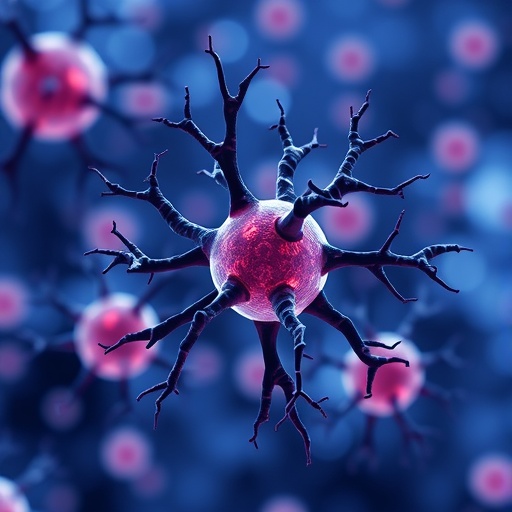A recent international study presented at ESMO 2025 has unveiled a compelling connection between thymic health and patient outcomes following treatment with immune checkpoint inhibitors in various cancers. The thymus gland, long known as a cornerstone of adaptive immunity due to its critical role in T cell development, emerges as a potential new biomarker for immunotherapy efficacy. This pioneering research, which utilized artificial intelligence to analyze standard chest CT scans, promises to shift the paradigm in precision oncology by integrating assessments of patients’ immune system capacity alongside traditional tumor-focused markers.
Immune checkpoint inhibitors have revolutionized cancer therapy, unleashing the immune system’s ability to recognize and destroy cancer cells by inhibiting molecular brakes such as PD-1/PD-L1 interactions. Despite their transformative impact, response rates vary considerably, and existing biomarkers like PD-L1 expression levels and tumor mutational burden (TMB) have limitations. These biomarkers primarily reflect tumor characteristics and often neglect the patient’s intrinsic immune competence, which may be a pivotal determinant in therapeutic success.
The research team, led by Dr. Simon Bernatz from the AI in Medicine Program at Mass General Brigham, embarked on a large-scale analysis encompassing nearly 3,500 patients undergoing treatment with immune checkpoint inhibitors. The cohort included diverse cancer types, with a significant subset of over 1,200 individuals diagnosed with non-small cell lung cancer (NSCLC). Utilizing a sophisticated deep learning framework, the researchers analyzed features from routine chest CT scans—measuring the thymus gland’s size, shape, and internal architecture—to derive a quantitative ‘thymic health score.’
What sets this study apart is the application of advanced AI in radiology to extract biologically meaningful data from imaging that is routinely collected but underutilized. The deep learning algorithms mapped out structural details of the thymus, creating a non-invasive proxy for immune system vigor. Remarkably, patients exhibiting higher thymic health scores demonstrated a 35% reduction in cancer progression risk and a 44% decrease in mortality risk in the NSCLC group. This evidence strongly suggests that a robust thymus correlates with superior immune system performance, enhancing responses to checkpoint blockade therapy.
Beyond lung cancer, the investigation extended to other malignancies such as melanoma, renal cell carcinoma, and breast cancer, revealing similar beneficial associations between thymic integrity and immunotherapy outcomes. This broad relevance underscores the thymus’s foundational role in immune regulation across oncologic contexts and marks thymic health as a universal biomarker candidate with wide applicability.
To validate the imaging-based assessments, a detailed immunologic analysis was conducted in a subset comprising 464 NSCLC patients. Researchers sequenced T-cell receptors along with associated proteins involved in T cell differentiation and function. The molecular data consistently matched the AI-derived thymic health metrics, confirming that the radiological signatures captured by the algorithm accurately reflect underlying immune competence.
Thymic involution, the natural decline of thymus function with age or disease, has historically complicated its use as a clinical biomarker given variability among patients. However, this study’s use of real-world imaging data and AI-driven quantification provides a standardized, reproducible measure of thymic status. This breakthrough overcomes prior challenges that limited thymic evaluation to invasive or specialized laboratory techniques, positioning it for integration into routine oncology workflows.
Dr. Bernatz emphasized that the thymus acts as the cradle for T cell maturation, making it a critical regulator of immune responsiveness. Harnessing this insight, he advocates for the inclusion of thymic health assessment alongside tumor-specific biomarkers to better stratify patients and personalize immunotherapy approaches. Such dual-layered biomarker frameworks could refine clinical decision-making, identifying patients more likely to benefit from immune checkpoint inhibitors or those who may require combinational therapies.
Yet, despite the promising findings, experts caution that prospective clinical trials are essential to firmly establish thymic health as a validated biomarker for immunotherapy. Dr. Alessandra Curioni-Fontecedro, Professor of Oncology at the University of Fribourg and an independent commentator, noted the study’s retrospective design as a limitation. Nonetheless, she acknowledged the rigorous validation cohorts and the practical advantage that chest CT scans are commonly performed in cancer patients, facilitating potential real-world application without additional patient burden.
The demand for more precise biomarkers in oncology remains urgent, especially to guide therapeutic choices in lung cancer where immunotherapy may be administered alone or combined with chemotherapy. Current tools inadequately predict which patients will respond optimally, leading to overtreatment or missed therapeutic opportunities. Incorporating thymic health evaluation could fill this critical gap, enabling more individualized prognostication and treatment tailoring.
Looking forward, this research introduces fresh avenues for leveraging AI in medicine—transforming everyday clinical imaging into a rich source of immunological insight. By decoding subtleties of the thymus’s physical condition, physicians could gain unprecedented clarity into a patient’s immune readiness, facilitating earlier intervention strategies, monitoring treatment efficacy, and potentially informing vaccine or cellular therapy development.
The integration of AI-driven thymic assessment represents a convergence of technology, immunology, and oncology that epitomizes the future of precision medicine. As randomized prospective trials unfold and software tools become widely available, the evaluation of thymic health may well become a standard component of cancer immunotherapy protocols worldwide, heralding a new era where the patient’s immune landscape is central to therapeutic strategy.
In summary, this landmark study illuminates the thymus gland as a vital—but previously overlooked—factor in cancer immunotherapy outcomes. The use of cutting-edge AI to mine routine CT scans offers a non-invasive and scalable method to gauge immune vigor, with substantial promise to transform biomarker panels and elevate patient care. As the oncology field continues to evolve, the ‘immune organ’ is poised to take its rightful place alongside tumor genomics as a key determinant of treatment response and survival.
Subject of Research: The relationship between thymic health and efficacy of immune checkpoint inhibitors across multiple cancer types.
Article Title: AI-driven Analysis of Thymic Health Predicts Immunotherapy Outcomes in Cancer Patients
News Publication Date: October 16, 2025
Web References: Not provided
References: Study presented at ESMO 2025 (specific citations not provided)
Image Credits: None provided
Keywords: Immune system, Immunology, Medical treatments, Cancer immunotherapy, Thymus, Biomarkers




